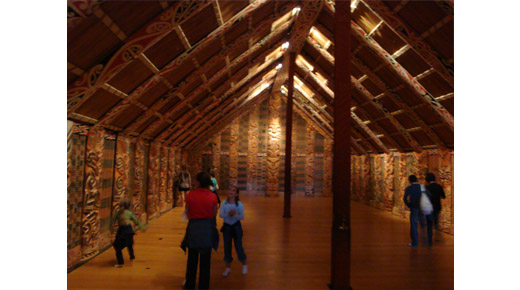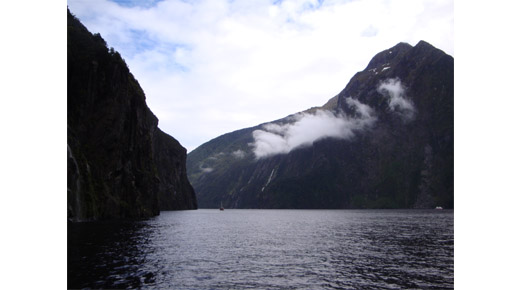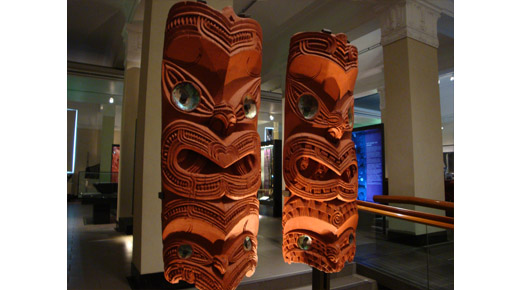|
HOME → RTWINFO → Jepson Trip → Jepson Girl's Blog → Post #021 The Jepson Girls' World Trip Blog 
Dec 7, Month 7 The history of New Zealand is a tale of two people, the Maori who came here first, and the English who later immigrated here. New Zealand's history also has a lot of conflict between these two parties. The Maori believe that they came from Hawaiiki where all Polynesians originate from. The Maori never told exactly where Hawaiiki is but present day society thini that it's in the Sam Island group like Tahitii. Around the fourteenth century, the Maori arrived in greater numbers. When the Maori got to the new land, they ate lots of things like berries and seafood, which they found in abundant supply. They also ate dogs and rats, taro, and kumuru / sweet potato, which they brought from Hawaiiki. The Maori lived in permanent villages with a courtyard called a Marae, and a meeting house, called Whare Runanga. They carved wood and tattooed in these places.  The first recorded Europeans to see New Zealand was Abel Tasman, who meet the Maori without even making it to land. The Maori shouted war calls to the Europeans from their war canoes. The next day the Maori killed four of the sailors in a cockboat that ventured close to shore. Abel left and called the bay Murder's Bay. It was known by that name for a long time. James Cook had orders in 1765 from King George the Third to claim New Zealand for the King. On October 17, 1768, Cook's ship saw land and sailed into a bay. But unfortunately, the Maori were hostile and wouldn't let Cook bring food or water to his crew. Cook claimed the land for King George and named the bay where he tried to come ashore Poverty Bay. For six months, Captain Cook sailed around and charted both islands. Except for Milford Sound, which couldn't be seen from sea, the chart was quite accurate.  Because of Cook's work charting the area, a lot of different types of people were attracted to go and seek their fortune. Sealers and whalers came in 1792 and killed most of the South Island's whales and seal colonies. Traders and merchants traded with the Maori who wanted guns. The trees were good for ship building and also attracted these traders and merchants. Europeans were immigrating from Great Britain. But for the Maori, they were experiencing lots of difficult changes. For example, the Europeans brought diseases that the Maori had no immunity to. Muskets were destroying the Maori tribes. Whalers were marrying Maori women and changed the ethnic make up of the people. Around the same time period, missionaries came and translated the Bible into the Maori language, which also became the first time the Maori language was written. The Europeans and Maoris began fighting and didn't stop for many years. There was harm on both sides. This made the missionaries complain to the British government who put people in place to try to keep the fighting down. Unfortunately, this action was completely inactive and the problems continued. Soon after, the British sent ships to buy land from the Maori so that they would have a place to settle their people. On February 6, 1840, a treaty to establish peace was signed. This treaty was called "The Treaty Of Waitongi." The treaty gave the Maori British rights but allowed the British to buy land that lead later to more conflict between the Maori and the British. There are many interesting facts in New Zealand's History. In the 1860's, gold was found on the South Island. The city Dunedin was the biggest city in the country at this time because of the gold rush. In 1892, the first lamb export was done. New Zealand was the first country in the world to allow women to vote in 1883. One hundred thousand soldiers went to war in World War I and lost the most soldiers per capita of any country involved in the war. On my visit to New Zealand, I have enjoyed seeing creative things in the shops. It also has wonderful scenery. If you are really quiet on the South Island, you can hear the sheep baaing. It is like they are telling the story of their ancestors. New Zealand has an adventurous spirit. With their bungy jumping and bungy swings. Did you know that New Zealand was the first place with bungy jumping? All I have seen will be with me forever.  |
 |

© Copyright 2009 www.RTWFamilyTravel.com, All rights reserved
 New Zealand's History - By Amber
New Zealand's History - By Amber